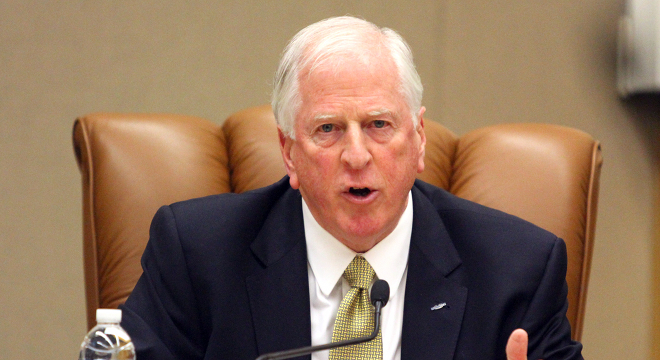A Democratic congressman from California said on Wednesday he wants to make a late addition to the gun proposals being considered by Congress and the White House.
Expanded background checks and a ban on high-capacity magazines have been all the talk in the push for gun control after the Newtown, Conn., schoolhouse massacre, but Rep. Mike Thompson said there should also be a discussion of paying states to take guns away from criminals and the dangerously mentally ill who are prohibited from owning them.
This week, Thompson introduced a bill that would do just that.
The Armed Prohibited Persons Act of 2013 would create a program within the Justice Department to give money to states that track down people who are barred from having firearms but own them anyway.
Thompson is in charge of crafting gun proposals for Democrats in the House, but it’s unclear whether the bill has a chance to pass. No such proposal has been part of discussions in the Senate, where a bipartisan group has been working on a deal to expand background checks. And it has not been among the major proposals being pushed by President Obama and the White House, which include a ban on high-powered rifles. Thompson’s bill also does not specify how much he would like to see the government spend on his idea.
Still, at least one gun rights group in Thompson’s home state has voiced support for the California program that served as inspiration for the bill, indicating there might be some room to negotiate with gun rights supporters.
“There are knuckleheads out there who do have guns and they are confiscated and they should be confiscated,” Sam Paredes, executive director of Gun Owners of California, told TPM. “We don’t have a problem with that. That’s OK. That’s crime-fighting.”
But Paredes said that his organization keeps an eye on how the program is carried out and stressed that “it cannot be a cookie-cutter approach nationwide.”
Thompson’s bill was inspired by a California program created in 2001 that has since seized thousands of guns statewide. It is run by the the Firearms Bureau of the California Attorney General’s Office, which cross-references state records of gun purchases with criminal history and mental health data. The office looks for people who legally bought guns before they were blacklisted. The result is California’s Armed Prohibited Persons System, which currently shows about 20,000 people illegally own an estimated 40,000 guns. The Bureau estimated 30 percent of prohibited gun owners are on the list due to mental illness.
The bureau has a team of 33 agents who dedicate almost all their time to tracking down people on the list and rounding up their illegal guns. Teams of about eight agents knock on the doors of people on the list and ask to search for guns. If they find any, they take them. If the person does not consent to a search, agents can return with a warrant.
In the first 11 months of 2012, agents seized more than 2,000 firearms, 117,000 rounds of ammunition and 11,000 illegal high-capacity magazines, according to statistics compiled by the California Department of Justice.
The program initially won over broad support in California, even from Republicans and gun rights groups like the National Rifle Association. But in a sign of how the landscape of the gun debate has shifted, the NRA no longer supports it, according to an attorney for the organization in California.
It’s “good in theory but bad in practice,” the attorney, Chuck Michel, told TPM on Wednesday. Michel said the details of the program, like its high cost and its funding through a fee on gun purchases, have made the NRA change its mind on the program.
“Nobody’s opposed to seizing firearms from violent felons,” Michel said. But he added that the state could find a more efficient way to do it. He said he’s uncomfortable with the state tracking gun purchases.
“This is a form of registration leading to confiscation,” Michel said. “But I’m not gonna defend people who are prohibited from possessing guns from losing them.”
One reason California is able to carry out the program is because it maintains gun sale records more than most states. In order to have enough information to implement a similar program, many states would have to improve their gun sales databases, an idea many Republicans are likely to oppose. In fact, the issue of whether to maintain sale records has been a sticking point holding up federal background check legislation in the Senate.
Thompson objected to the idea that the seizures of illegal guns would even be deemed confiscation like Republicans have worried about. A more appropriate description, he told TPM Tuesday, was “facilitation of court orders.”
“They don’t kick your door down,” he said. “It’s outreach.”






